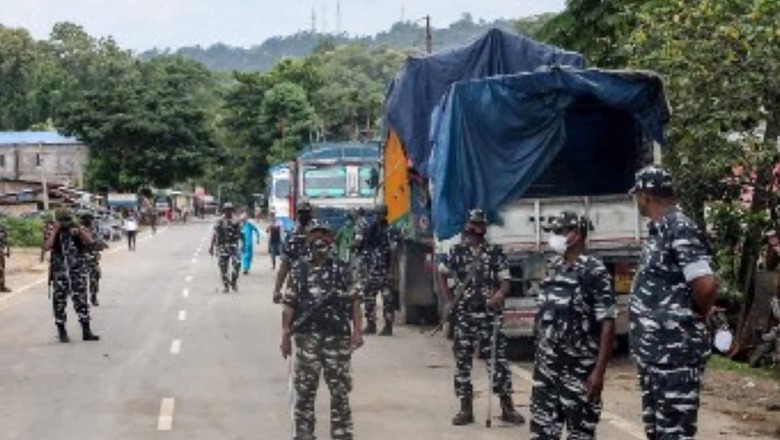
views
Armed Forces Special Powers Act (AFSPA) has led to successful operations in the northeastern states in the last three years, leading to the surrender of several insurgents and recovery of weapons and narcotics worth crores of rupees, security and defence officers have told News18, even as civil society experts say the Act should be fully repealed or at least the territories under the Act should be reduced.
According to the official data accessed by News18.com, the security forces have apprehended as many as 464 insurgents from southern part of Arunachal Pradesh, Assam, Nagaland and Manipur in 2021 alone and have seized narcotics and worth Rs 964 crore from these four states.
Moreover, 65 insurgents were arrested this year from the southern districts of Arunachal Pradesh, 200 from Nagaland and 171 from Manipur and 28 from Assam, while seven have been killed in south Arunachal Pradesh and Manipur and Assam each.
Narcotics worth Rs 33 crore, Rs 15 crore and Rs 916 crore were seized in south Arunachal Pradesh, Nagaland and Manipur this year, the data showed.
Around 57 weapons were recovered from insurgents in south Arunachal Pradesh, 163 from Nagaland and 165 from Manipur and 33 from Assam.
In the last two years, 95 and 75 insurgents were caught in south Arunachal Pradesh, 176 and 205 in Nagaland, 422 and 213 in Manipur, the data added.
The central government on Sunday constituted a high-level panel to look into the repeal of the controversial Act in Nagaland.
The five-member committee headed by Registrar General and Census Commissioner of India Vivek Joshi will submit the report in 45 days.
The move was prompted by a botched Army operation earlier this month in Nagaland’s Mon district, which led to the killing of 14 civilians and an Army jawan, triggering protests across Nagaland over the withdrawal of AFSPA from the state.
‘Complete Withdrawal of AFSPA Will Halt Ops’
A senior security official said while AFSPA in its present form may not be the way forward, its complete withdrawal from Nagaland and other northeastern states may not be the best solution too. He said it can at the most be amended or partially removed in line with the present ground realities.
“In the backdrop of the current security situation in the northeast, complete removal will halt operations,” the official said.
Sources also said a complete removal of AFSPA might also affect India’s preparedness at the Line of Actual Control with China since insurgents will have a free run in the hinterland and will be able to re-organise, rearm and build up their capabilities and capacities. “In case of tensions at the LAC, they can interdict the Army’s mobilisation and create troubles.”
How Does AFSPA Function?
The functioning of AFSPA is based on a series of steps taken by the state and the central government. When the state government feels that the armed insurgent movement(s) have reached an extreme level of violence and the existing law and order mechanism is unable to act effectively to stem it, the area is declared as “Disturbed Area” by way of an Official Gazette notification.
Security sources say AFSPA empowers security forces to operate in insurgency affected areas. As long as the area remains “disturbed”, the need for the Act stays.
A second source said the Act affords minimum essential protection to members of Armed Forces to ensure fulfilment of the constitutional obligations. The central government can sanction prosecution or other legal proceedings against personnel, who act in contravention to applicable laws and SOPs.
Once the area is no longer assessed to be “disturbed” and the law and order situation is not in a “dangerous condition” that the use of armed forces in aid of the civil power is necessary, applicability of AFSPA is no longer extended, following which the Army can be withdrawn, according to sources.
The applicability of the Act has already been withdrawn from Meghalaya, Mizoram and Tripura where the security situation has shown improvement, the source said. The armed forces have established a robust mechanism to investigate alleged human rights violations and defaulters, if any, are punished. This has substantially brought down violations in the last few years, he added.
Former Director General of Assam Rifles Lt. Gen. Shokin Chauhan (retd) said AFSPA is not the criminal here. “The enabling act must remain for the Army to continue to remain engaged in counter-insurgency operations. What must change is the conduct of operations in Nagaland by the Army,” the former chairman of the Ceasefire Monitoring Group, Nagaland, said.
‘Cannot Have Such Laws for Perpetuity’
This is not the first committee, which has been set up by the Centre, to review AFSPA in the northeast. In 2004, the Ministry of Home Affairs has instituted a five-member committee under the chairmanship of Justice BP Jeevan Reddy, a former judge of the Supreme Court, to review the AFSPA, in the wake of the massive agitation launched by the civil society groups in Manipur after the death of Kr. Th. Manorama Devi in 2004 in the custody of the Assam Rifles.
The committee in its report, submitted in 2005, had recommended the repeal of the AFSPA, but had suggested that relevant provisions could be included in the Unlawful Activities (Prevention) Act, 1967. It also recommended other measures such as setting up of grievance cells in districts, coopting civil administration as much as possible during raids.
A report filed by amicus curiae Menaka Guruswamy to the Supreme Court in 2017 had pointed to a delayed justice and gross misuse of AFSPA in Manipur and recommended an independent SIT investigation in the “extra-judicial killings by security forces” in the state.
Sanjoy Hazarika, an author and a commentator on issues of the northeast, said “ideally” AFSPA should not be there in a democratic country. Hazarika, who was a member of the Justice BP Jeevan Reddy committee, however, said the reality is that a few governments would like to climb down from long held positions.
“The Armed Forces are there in the northeast as the political leadership wanted it from the beginning. But the current situation in the region is completely different to what it used to be in the past,” Hazarika said.
There are only “few real” insurgencies and most groups are in peace talks with the government or have not been able to sustain an armed movement as public support has withered with growing violence, he added.
He said it’s more of a law and order problem, which is the job of the police and not the Army’s special forces.
Nagaland, which has suffered some of the worst human rights abuses over decades, is one of the few states without a state human rights commission. The state government must ensure that it sets up a body to look into such violations.
“The army needs to be the last resort and not the first as it has been for decades in the northeast. The Reddy committee and other assessments have held that these situations are not national security threats, but more of law and order problems,” he said.
Hazarika said even if AFSPA was fully repealed, governments should reduce the territory under its grip by defining specific designated areas as “disturbed”. “We cannot have such laws for perpetuity.”
“People will heave a sigh of relief if a decision is taken to reduce the area declared as disturbed.” The findings of the Mon incident probe should be made public soon, he pointed out.
Read all the Latest India News here




















Comments
0 comment